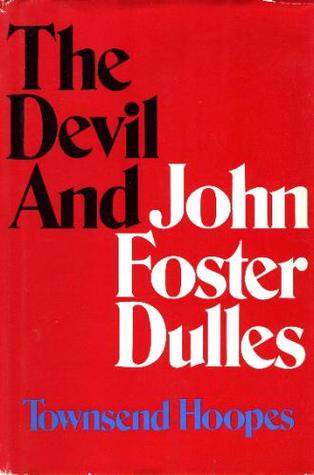

 |

|

The average rating for The devil and John Foster Dulles based on 2 reviews is 2.5 stars.
Review # 1 was written on 2015-03-06 00:00:00 Paul Refakis Paul RefakisScholarly work that mainly follows the life of John Foster Dulles, Secretary of State under Dwight Eisenhower from 1953-1959. I say mainly follows, as even though this is technically a biography, the primary focus of the book seems to be not so much on Dulles per se as on his handling of events during his tenure in office. At that point it seems to be more a review of Eisenhower's foreign policy than anything else, with only occasional personal tidbits thrown in about Dulles. The book begins like a typical biography, following Dulles through his boyhood in New York State, and being influence heavily by two Secretaries of State who he was related to: John Foster, his grandfather, and Robert Lansing, his uncle. So, Dulles knew what he wanted to be at an early age. He did attend the Versailles Peace Conference in 1919 and was on the fringes of Woodrow Wilson's doomed attempt to create a powerful League of Nations. After WWI, he went into law, becoming a partner at a young age (38) and slowly becoming active again in foreign affairs. He was a consultant, and later an Ambassador-At-Large during the Truman Administration, working closely with Dean Acheson. Perhaps his most notable achievement in foreign affairs was the Japanese Peace Treaty, which occurred during this time. He was an adviser to Governor Thomas Dewey, and when Ike became President he was selected as Secretary of State. Here the book slows down considerably, and focuses on Dulles' rigid anti-communism and preacher-type self-righteousness. He was a very closed-minded individual - viewing anyone who disagreed with him as an enemy, and not caring enough to even attempt to understand someone else's viewpoint. This rigidity caused some long-rage issues for the U.S.: paving the way for American involvement in the Vietnam War in the 1960s, missing opportunities to establish better relations with both China and the USSR, and a complete misreading of the Suez Crisis in 1956. Dulles became ill in the late 1950s with cancer, and ended up dying in May 1959, having resigned his post in April of that year. His legacy is not a positive one, as he is mostly remembered for his inflexibility and his seeming ability to irritate his allies. Hoopes seems to get away from Dulles the person after awhile; this makes the book less interesting, to me, to read. He also mentions almost nothing about how Dulles' colleagues and employees in the State Department viewed him, and about his relationship with fellow Cabinet members. Even his brother Allen, CIA Director during this time, is seldom mentioned. Grade: B- |
Review # 2 was written on 2017-10-19 00:00:00 Patricia Buckingham Patricia BuckinghamThis is a rather short book given the scope of the cold war. But it is well written and is ideal for anyone starting a study of the cold war. Its biggest flaw is the fact that it's a US-centric work. Tho it's not overbearing in any sense. It's biggest strength is that every chapter is uniquely thematic and each comes with a bibliography specific to the chapter in question. This should be recommended to any student beginning a study of the cold war or to educated general readers who may want to delve more into the topic. |
CAN'T FIND WHAT YOU'RE LOOKING FOR? CLICK HERE!!!